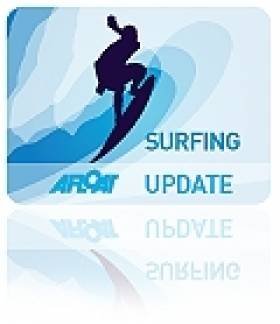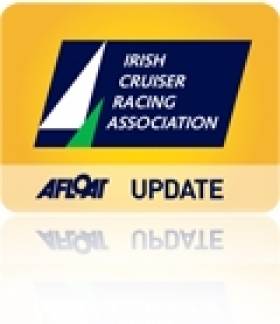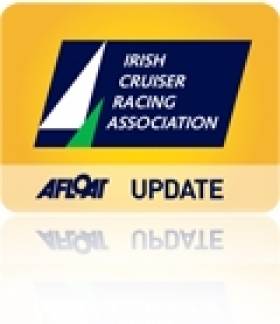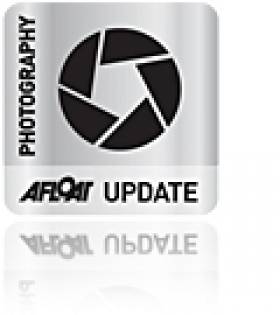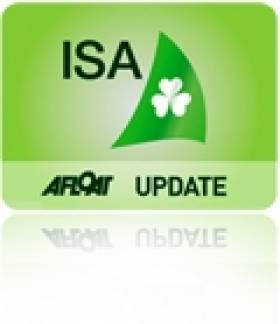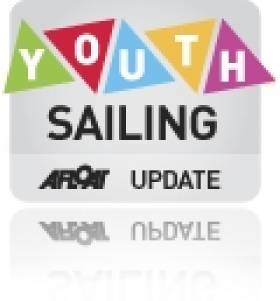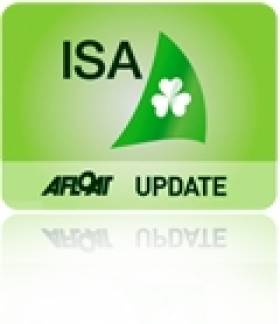Displaying items by tag: Royal Cork
Cork Surfers Brave More Than The Cold!
There'a always a sliver lining around our coast. Whats a problem for some can be turned to advantage for others. A reef that sailors avoid during racing on coastal courses from Royal Cork presented the perfect setting for some Cork Harbour surfers at the weekend writes Brian Carlin.
A local hazard, the reef is situated approximately a mile west of the entrance to Cork Harbour, dangerous at high tide as most of the reef is immersed. SCROLL DOWN FOR IMAGES.
Surfers took advantage of the direct southerly swell, the surfers, Mark Barry, John Powell and Brian Hartnett, explained only in these conditions is the reef surfable. The trio enjoyed the best of the January sunshine and gave the shoreline spectators a show worth watching. Photos by Brian Carlin.
Nicholas O'Leary is Afloat's November Sailor of the Month
Nicholas "Nin" O'Leary of Cork has re-written the Irish sailing records, and he's only 24. The new All Ireland Champion Helm is clear winner of the Afloat.ie/Irish Independent "Sailor of the Month" award for November after a nail-biting finale in difficult conditions off Kinsale, making it three-in-a-row for this junior skipper who was winning major titles with impressive scorelines well before he was out of his teens.
The wind was drawing from the east for the 20th November shootout in the ISA's SailFleet of J/80s. But the challenge lay in the fact that, after a week of strong winds up to gale force, a massive swell was rolling in past the Bulman Buoy to provide sea conditions which were out of sync with the strength of the breeze.
Yet the three top Royal Cork helms showed they were up to the challenge. In fact, it was Neil Kenefick, in the championship through being tops in the ICRA series in 2010, who best got to grips with the racing in the early stages, posting two wins with Anthony O'Leary second in the first race, while son Nicholas was second in the next one.
But the junior O'Leary moved nearer to retaining the title by winning the third, though his father was right there with a second, while James Espey from the Lasers posted a third. However, Kenefick was in touch with a fourth, but that became his discount as he nailed a couple of thirds in the two concluding races.
Going into the fifth and final race, the three Crosshaven helms were neck-and-neck on points, but O'Leary Junior put it neatly away by slicing in ahead of his father, with Kenefick third. The Corkmen were out on their own, as next in line was Puppeteer 22 Champion Garret May, but he concluded with 18 net points, while Neil Kenefick was on 8, Anthony O'Leary on 7, and Nicholas O'Leary the supreme champion on 6. And making a bit of history while he was at it - the first three-in-a-row in the All Ireland's 64 years.
SCORA Meet to Discuss the State of South Coast Sailing
The 2010 Annual General Meeting and Prizegiving of the South Coast Offshore Cruising Association (SCORA) will take place at Kinsale Yacht Club on Friday December 3rd at 8pm.
Hugh Mockler of HM Yachts will present the League prizes for the eighteen race series that included the Kinsale April league and the Royal Cork Autumn League.
Des Mc William of McWilliam One Sails will present the championship prizes for the series that was sailed in Cobh in September.
The SCORA Committee will present a series of sailing action photographs from the various events covered by Sailing Photographer Bob Bateman during the season.
The meeting will discuss the state of sailing on the South Coast and the ongoing development of the Echo progressive handicap system, together with the possible movement of class bands.
At the close of the sailing season an interesting evening is assured so all sailors are urged to attend and avail of the opportunity to air their views on the handicap system and the class bands.
Commodores' Cup Boats Jointly Awarded Boat of the Year Award
There was a strong seal of approval from sailing delegates at the ICRA Conference yesterday evening for the decision to award the Boat of the Year prize to all three Royal Cork boats from the winning Irish Commodore's Cup team.
Antix, Marinerscove and Roxy lifted the trophy to loud applause at the Carrigaline Court Hotel, the venue for ther eighth annual meeting of Irish Cruiser Racer interests. Last night Commodores Cup celebrations continued at the Royal Cork Yacht Club at a special dinner in honour of the team who brought home the cup after more than a decade of attempts.
In announcing their decision the ICRA judging team stated that as there was 'no way they could split the RCC boats that made up the winning team' this summer. The decision had been expected given the importance of the international victory in Cowes.
Earlier this month a readers poll on Afloat.ie that attracted nearly 3,000 votes showed an offshore yacht Raging Bull from Skerries to be a popular choice for the trophy. HERE. Discussion HERE. It's an indication of the widening appeal of a part of the sport that has been rekindled on the Irish Sea.
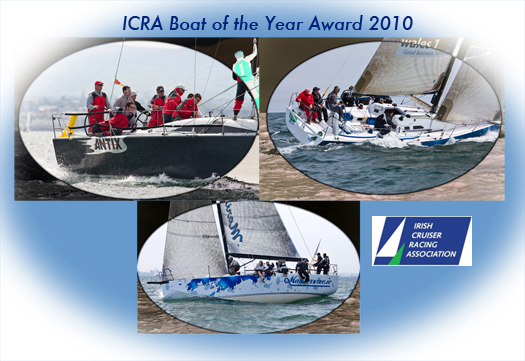
ICRA's Boats of the Year: The Cork team that won the Commodore's Cup. Montage by Bob Bateman
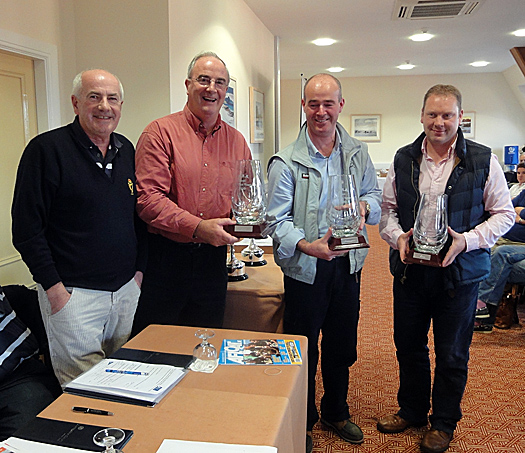
Winning Trio: ICRA Commodore Barry Rose (left) with skippers Anthony O'Leary, Dave Dwyer and Andrew Creighton. Photo by Peter Ryan
New Trailerable 30 Footer to be Unveiled at ICRA Conference
Commodore Barry Rose is urging Cruiser Racers fans to support this weekend's eighth annual ICRA conference at the Carrigaline Court hotel in Carragaline, County Cork.
There's a big line up for the one day event that includes a presentation on an innovative concept to develop a 30 Footer one design concept that can also sail under IRC handicap. The idea is that it will be trailerable to attend ICRA Nationals and other events around Ireland. Rory Staunton travels from the UK to make the 30 footer presentation.
Rose says Saturday's event gives an opportunity to exchange 'constructive opinions to promote and develop the cruiser/racing', the biggest sector of Irish Sailing.
The event includes a celebration dinner for the Commodores Cup team at the Royal Cork Yacht Club.
Designers John Corby and Mark Mills will be present to update us on IRC developments and boat design and their thoughts on where boat design is heading. More HERE
Commodores' Cup Celebration Dinner to be Held at Royal Cork
Team Ireland boats, Antix - Anthony O Leary, Marinerscove.ie - Dave Dwyer and Roxy 6 - Rob Davies and Andrew Creighton, will be represented on the night.
The dinner cost will be €30 and booking will be on first come/first served basis. Book with [email protected] or call 021 4831023.
Royal Cork Autumn League. Photos HERE!
ISA Seek New Date for All Ireland Event
Following the abandonment of the All Ireland Sailing Championships at Royal Cork last weekend due to lack of wind the Irish Sailing Association (ISA) has yet to announce dates for the rescheduled event. An autumn date to accomodate all concerned is the objective, the association said yesterday. The eight finalists involved are; Anthony O'Leary, Neil Kenefick, Nicholas O'Leary, Garrett May, Niall Henry, James Espey, Nick Walsh and Ewen Barry.
Doran Reigns In Junior All Ireland Event
It was a very long day of sailing in very light conditions for the Juniors on the second and final day of the All Ireland Junior Championship writes Claire Bateman. PRO Richard Leonard raced the fleet on the Curlane Bank in Cork harbour and was very fortunate to be able to get in three races in extremely difficult conditions.
The final result saw Philip Doran of Courtown Harbour SC taking first place with Rory Lynch of of Blessington Sailing Club second and Ross Vaughan of
Royal North of Ireland YC third.
In the Girls Fleet Sophie Murphy of Quoile YC took first place with Emma Geary of RCYC second and Katherine Geoghegan of Dungarvan Harbour SC third.
Photos of the Junior All Ireland Prizegiving and competition by Bob Bateman HERE.
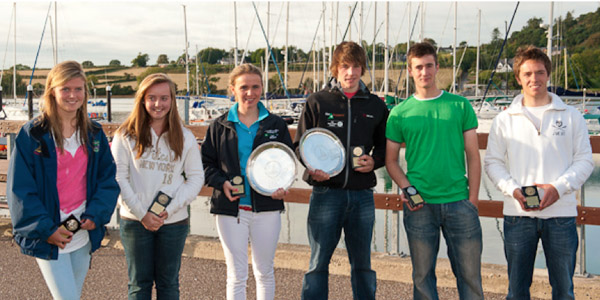
All Ireland Championships Abandoned Due to Lack of Wind
Lack of wind in Cork harbour forced the abandonment of the All Ireland sailing championships this afternoon. Although each flight had been able to sail two rounds since the competition began on Friday the invited class champions had a long wait for wind before Royal Cork organisers scrubbed the event at 4p m today. The Irish Sailing association say the event will be rescheduled. Discussion on the forum HERE.



























